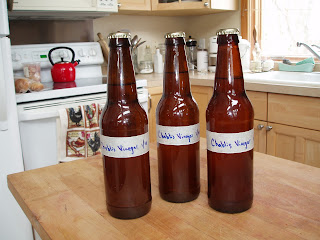Despite the long hiatus in our posting we have been busy this winter. Most of our mini-farm-made produce involves fermenting and brewing - including lots of vinegars, beer for the summer, limoncello, kefir, yogurt, miso and bread baking. We've been experimenting with jerkies too. The photo above shows our experiment with making cider vinegar. I used a champagne yeast with one gallon of cider - with an air lock - fermented for a month and then combined with 'mother'. The other batch was just poured from the gallon into a jar and allowed to sit for 4 months. Surprisingly, the 'natural yeast' batch is forming a better 'mother' - so we'll see about flavor down the road. I started making vinegar last year with a 'raw culture' from Bragg's vinegar. Combined with a cup of this raw vinegar, a bottle of wine will take 4-6 months, depending on temperature, to form the thick 'mere de vinaigre' on top. The acidity of the finished product depends on how long the vinegar is allowed to feed. We also have been experimenting with adding small amounts of new wine or beer every few weeks. The only real requirements for the culture are relative darkness, warm (70 degree) temperatures, plenty of oxygen (so use a cloth top), and because the culture uses oxygen it rests on the top of the liquid. Disturbing the jar can cause the mother to sink. Although a new one will form, I think its best to refrain from agitating the jar too much.
After 13 months this Chablis Vinegar tasted perfect. I removed the mother and used it for another vinegar - then strained this one through coffee filters. It wasn't necessary, but I did 'pasteurize' it by bringing just to a boil for a minute. This kills the microorganisms and allows me to bottle and cap it without worrying about exploding bottles. Another option which I did try last year was to cork the bottles and periodically open them to relieve any pressure.
The vinegar tastes better after resting for 6 months or so. These will be perfect by next fall and will only deepen in flavor over time. Each beer bottle of vinegar uses more than a bottle of wine, after evaporation during fermenting. I'm hoping these will make good gifts for the holidays next year!




Wow, making your own vinegar looks very interesting. That's something I'll have to look in to when I have a chance.
ReplyDelete